2013 Toyota Prius V Tires & Services
Get Started
Complete Auto Care for Your 2013 Toyota Prius V
-
TIRES FOR YOUR 2013 Toyota Prius V View Tire Info GET TIRE PRICING
-
REPAIR FOR YOUR 2013 Toyota Prius V View Repair Info SCHEDULE REPAIR
-
MAINTENANCE FOR YOUR 2013 Toyota Prius V View Maintenance Info SCHEDULE MAINTENANCE
-
OFFERS FOR YOUR 2013 Toyota Prius V Limited Time Tire Offers VIEW ALL COUPONS
2013 Toyota Prius V Tires
Recommended Tires | Tire Information
2013 Toyota Prius V Tires Sizes, Speed Ratings, and Inflation
Not sure about your 2013 Toyota Prius V tire size? Use the following chart to find information on tire size, speed rating, and inflation.
| Trim Level | Speed Rating | Inflation in PSI F/R | Tire Size |
|---|---|---|---|
| 2013 Toyota Prius V Five* | W | 33 PSI/32 PSI | P215/50R17 |
| 2013 Toyota Prius V Five* | W | 33 PSI/32 PSI | P215/50R17 |
| 2013 Toyota Prius V Two* | V | 35 PSI/33 PSI | P205/60R16 |
| 2013 Toyota Prius V Two* | V | 35 PSI/33 PSI | P205/60R16 |
| 2013 Toyota Prius V Three* | V | 35 PSI/33 PSI | P205/60R16 |
| 2013 Toyota Prius V Three* | V | 35 PSI/33 PSI | P205/60R16 |
|
2013 Toyota Prius V Five* Speed Rating: W Inflation F/R: 33 PSI/32 PSI |
|
2013 Toyota Prius V Five* Speed Rating: W Inflation F/R: 33 PSI/32 PSI |
|
2013 Toyota Prius V Two* Speed Rating: V Inflation F/R: 35 PSI/33 PSI |
|
2013 Toyota Prius V Two* Speed Rating: V Inflation F/R: 35 PSI/33 PSI |
|
2013 Toyota Prius V Three* Speed Rating: V Inflation F/R: 35 PSI/33 PSI |
|
2013 Toyota Prius V Three* Speed Rating: V Inflation F/R: 35 PSI/33 PSI |
* Note: these models have different tire sizes depending on vehicle options.
Recommended Tires for Your 2013 Toyota Prius V
What tires are best for a 2013 Toyota Prius V? Check out the following tire brands and types.
 Blizzak WS90
Blizzak WS90
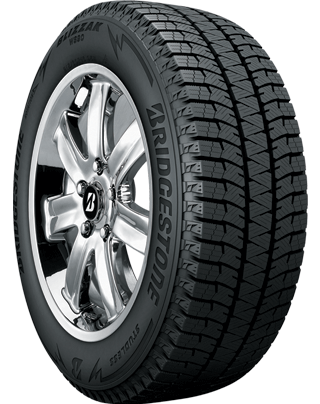
- No warranty
- Winter
- Winter
 Ecopia EP422 Plus
Ecopia EP422 Plus
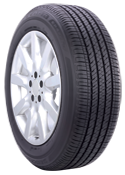
- Platinum Pact Limited Warranty
- All-Season
- Performance
 Potenza Sport AS
Potenza Sport AS
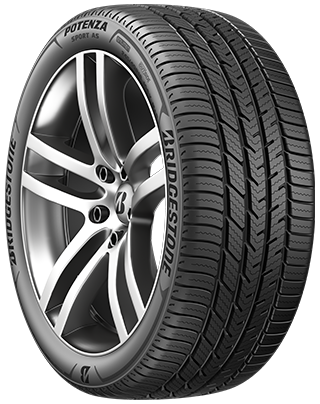
- Platinum Pact Limited Warranty
- All-Season
- Performance
 WEATHERPEAK
WEATHERPEAK
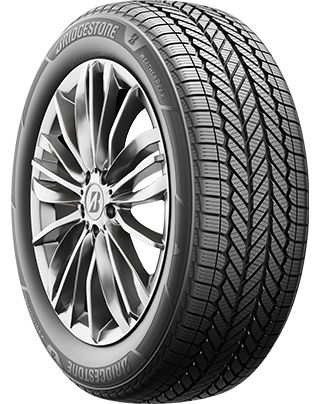
- Platinum Pact Limited Warranty
- All-Season
- Passenger Tires
 Turanza QUIETTRACK
Turanza QUIETTRACK
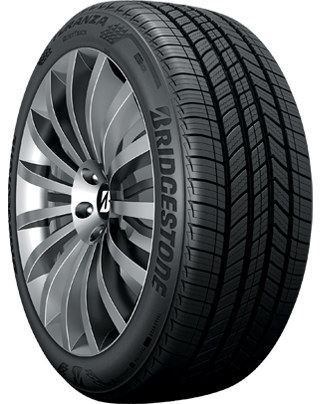
- No warranty
- All-Season
- Performance
 Turanza T005
Turanza T005
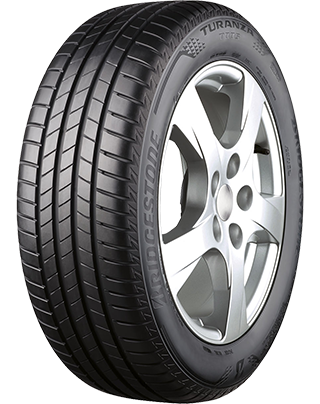
- No warranty
- Summer
- Performance
 Firehawk AS V2
Firehawk AS V2
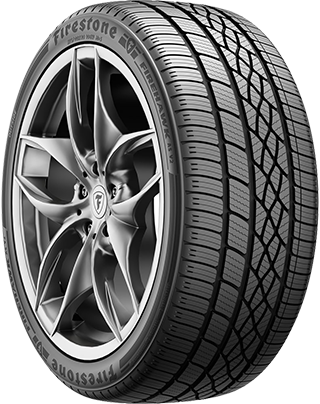
- No warranty
- All-Season
- Performance
 FT140
FT140
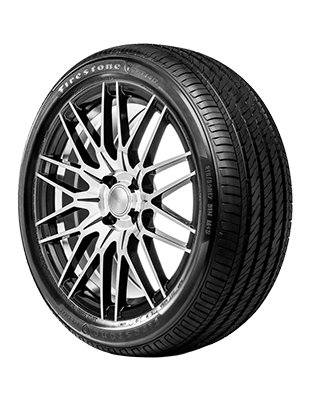
- No warranty
- All-Season
- Passenger Tires
 WEATHERGRIP
WEATHERGRIP
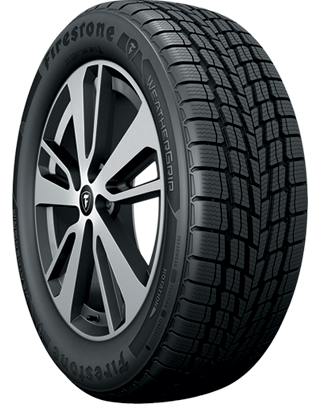
- No warranty
- All-Season
- Passenger Tires
 Winterforce 2
Winterforce 2
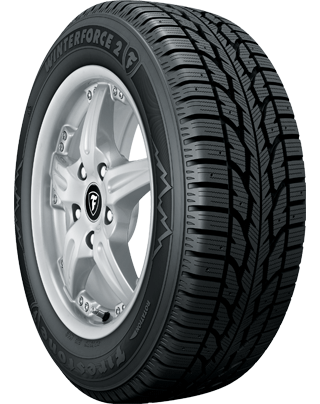
- No warranty
- Winter
- Winter

- No warranty
- All-Season
- Performance

- No warranty
- All-Season
- Passenger Tires

- No warranty
- All-Season
- Passenger Tires
 Extensa A/S II
Extensa A/S II

- No warranty
- All-Season
- Passenger Tires
 PROXES Sport A/S
PROXES Sport A/S
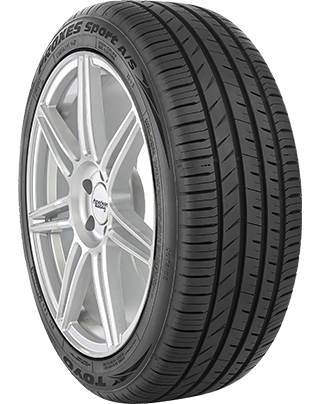
- No warranty
- All-Season
- Performance
Choosing 2013 Toyota Prius V Tires
Beyond the correct tire size, you also want to think about a couple of other things when getting new Toyota Prius V tires like where and how you drive, and what tire brand you trust most. Think about where you live (countryside vs. city vs. mountains) and the kind of unexpected weather you're likely to experience when evaluating your driving conditions. Many drivers who live in states that experience all four seasons choose to purchase two sets of tires: one for winter and one for summer. Other drivers prefer to purchase one all-season set to limit trips to the tire shop and make sure their vehicle is prepared in the rain, sleet, snow, or sun!
Next, consider your driving style. If you're a big off-roading fan who forges paths where others can't, you have very different needs than a long-distance commuter who sticks to the highway. Talk to a tire technician at Firestone Complete Auto Care for help choosing the best tire for you, or start shopping for Toyota Prius V tires online.
2013 Toyota Prius V Tire Installation & Rotation
Firestone Complete Auto Care installs more tires on more cars than most other companies. We're your one-stop shop for tire installation, rotation, and ongoing maintenance! Shop 2013 Toyota Prius V tires online and schedule an installation appointment.
2013 Toyota Prius V Tire Q&A
-
Why does Toyota tire inflation matter? Even a tiny decrease in tire pressure could impact your safety and fuel economy. Maintaining proper tire pressure can help increase fuel economy, improve braking time, and boost tire lifespan.
-
What do the numbers on my Toyota Prius V tires mean? Your tire sidewall numbers tell you the recommended load carrying capacity, speed rating, treadwear, traction, and tire size. Talk to a tire technician to learn how to read Toyota tire numbers.
-
Is there an easy way to check Toyota tire tread depth? Stay on top of your tire tread depth to help avoid a dangerous drive. You can check tread depth with a penny. Hold the penny so that Abraham Lincoln is facing you, then place your penny into a tread groove upside down. If you can see the top of Abe’s head, your tread is shallow and it might be time for new Toyota Prius V tires. Grab a penny. Hold the so that Abe Lincon's head is facing you and his hair is pointing toward the ground. Then, place the penny into a tread groove. If you can see the top of Abe’s head, your tread is shallow and it might be time for new Toyota Prius V tires.
Types of 2013 Toyota Prius V Repairs
How do I learn more about auto repairs? Click on a service below to read about the types of Toyota Prius V repairs we do at Firestone Complete Auto Care.
2013 Toyota Prius V Repair Information
No driver looks forward to car repairs. But at Firestone Complete Auto Care, we strive to give you the excellent repair experience you deserve. Bring your 2013 Toyota Prius V in for repair services and our technicians will take care of your Prius V like it was their own. We’ll start by assessing what repairs may be needed, and we’ll provide you with a detailed explanation of what we recommend. If a repair isn't necessary, we won't recommend it.
What Will Toyota Prius V Repairs Cost?
The cost to repair your 2013 Toyota Prius V depends on which repairs are needed, prices of appropriate replacement parts, how much labor the repair will take, and where you live. And check back often — we update our deals regularly!
A few different aspects can influence repair costs for your 2013 Toyota Prius V, like
Questions About 2013 Toyota Prius V Auto Repairs
-
Do I need to follow Toyota's maintenance schedule? One of the best ways to prevent 2013 Toyota Prius V repairs is by staying on top of your Toyota maintenance schedule. This schedule is written by the people who made your vehicle and they know best how to keep it running smoothly.
-
What does it mean to be 'in tune' with your car? You’re in your car, day in and day out. So, it’s only expected that you know your car better than anyone else! If you notice mysterious smells, strange engine noises, or other out-of-the-ordinary symptoms while driving, trust your instincts and stop into Firestone Complete Auto Care for a Courtesy Check. Catching a potential issue early could help prevent Toyota Prius V repairs.
-
Why do you recommend certain repairs for my Toyota? Talk to your technician. We'll never recommend a service or repair for your 2013 Toyota Prius V that we don't think is necessary for your safety.
Brake Repair for Your 2013 Toyota Prius V
Your Toyota Prius V may be powered by a strong engine. But if you can’t brake, it might as well be scrap metal. If you’re experiencing squeaky brakes or a loss of braking power, don’t wait! Safe driving and responsive brakes go hand in hand. Plus, ignoring your brake problems can result in more damage and higher brake repair bills. Visit Firestone Complete Auto Care for the right brake repair for your 2013 Toyota Prius V. We offer many affordable brake repairs like brake pad/shoe replacement, brake rotor/drum machining, brake fluid exchange, and brake caliper and wheel cylinder installation.
Questions About Your Toyota Prius V Brakes
-
Why does my Prius V shake when I brake? Faulty brake calipers, worn brake pads or rotors, loose or worn suspension parts, and warped rotors can cause your Prius V to shake during braking. If you’re experiencing odd brake behavior, schedule a free brake inspection at a nearby Firestone Complete Auto Care.
-
What is the average lifespan of Prius V brake pads? Brake pads typically last about 30,000 to 40,000 miles. However, driving conditions can affect this range. Sticking to highway driving and braking smoothly can help extend the life of your brake pads, while towing heavy loads or frequently riding your brakes can shorten it.
-
Does brake fluid leak when the car is off? Your Prius V has a closed hydraulic brake system, meaning you should not have a brake fluid leak under normal conditions. However, parts of your brake system can wear out over time or become damaged, which can lead to a brake fluid leak.
2013 Toyota Prius V Drivetrain Repairs
Drivetrains for front, rear, and all-wheel-drive and 4WD vehicles are not all the same. You don't want to go to any random shop for drivetrain repair. You want to go to Firestone Complete Auto Care. We can take care of most 2013 Toyota Prius V drivetrain components Your Prius V might need driveshaft repair if you notice vibration as your vehicle accelerates, clunks when shifting, heavy vibrations in your floorboards, or resistance when turning.
2013 Toyota Prius V Drivetrain Q&A
-
What are signs my Toyota drivetrain is damaged? Your Toyota Prius V drivetrain might be damaged if you notice strange noises from the rear of your vehicle, see fluid leaking, or have issues turning.
-
Why is my Prius V malfunction indicator light (MIL) on? Engine problems, transmission problems, faulty sensors, electrical issues, misfire issues, and connector problems could all cause your Prius V’s malfunction warning light, or better known as the check engine light, to illuminate.
-
Is a drivetrain malfunction in my Prius V serious? A drivetrain malfunction in your Prius V should never be taken lightly. Driving with a malfunctioning drivetrain can put you in danger and lead to further vehicle damage, so it's essential to have a qualified mechanic assess and repair the problem as soon as possible.
2013 Toyota Prius V Alignment Services
With an alignment service, adjustments are made to your Toyota Prius V’s suspension system, the connection between the vehicle and the wheels. During the service, your tire angles are adjusted according to measurements recommended by Toyota. Why? So that your tires can make contact with the road at the best possible angle. When you bring in your 2013 Toyota Prius V, we’ll perform an alignment check first. Then, we’ll adjust the angles as needed until they match recommended measurements from Toyota.
Questions About Toyota Prius V Alignment
-
Are there road conditions that can hurt my Toyota Prius V alignment? Potholes and uneven roads can knock your car out of alignment, so stay aware of the road ahead and adjust your speed (or avoid these obstacles whenever it’s safely possible).
-
When should you get a wheel alignment for your Prius V? Check your Prius V owner's manual for Toyota's recommended interval. It's generally a good idea to check your alignment every 6,000 miles or 6 months, depending on which comes first.
-
Does getting new Prius V tires mean you need an alignment? You likely aren't required to get an alignment when you put new tires on your Prius V, but it's a super smart idea! An alignment can help ensure optimal tire wear, fuel efficiency, and handling. Still, you should reference your Prius V owner’s manual for what’s recommended.
2013 Toyota Prius V Engine Repair
If your 2013 Toyota Prius V needs engine repair, our technicians will make sure you understand what’s going on before they start working on your engine. We don't start working until we have your approval. If a service can wait, we’ll make sure you know. If it's necessary for your safety, we'll make sure you understand that, too. We seek to give you all the info you need to make a smart decision about our services. Choose Firestone Complete Auto Care for Toyota Prius V engine repairs and you can feel confident knowing that we use Toyota-approved parts and components like the cambelt, motor oil seal, fuses, or a different component.
2013 Toyota Prius V Engine Q&A
-
Why does the check engine light come on when I start my Prius V? Generally, your check engine light turning on upon ignition is not a bad thing. It’s just your Prius V firing up its circuits. The light should turn off in a bit, but come see us if it doesn't.
-
Why is my Toyota Prius V making engine noise? Strange under-the-hood noises can point to problems within your Toyota Prius V engine. Tapping or knocking could mean you need an oil change. Whistling sounds could mean you have an intake leak or misaligned belt. Squealing may be caused by a loose fan belt, and grinding could be a sign that something is wrong with your brakes — not the engine.
-
What could damage my Toyota Prius V engine? Certain driving habits can damage your engine and should be avoided. These habits include 'running on fumes,' revving the engine while still in Park, or pushing 'the pedal to the metal' before the engine has warmed up. Help sustain your engine’s performance and efficiency by staying miles away from these bad driving practices.
Tire Repair for Your 2013 Toyota Prius V
Firestone Complete Auto Care is here for you when your 2013 Toyota Prius V needs flat tire repair or inspection. Our tire technicians can determine whether it's safe to plug and patch the tire, or whether it needs to be replaced. To start, we’ll consider the location of tire damage, the type of issue, the size and scope of the damage, and the amount of wear on your tires.
If a repair on your 2013 Toyota Prius V tire is feasible and safe, we’ll get to work on the steps to fix it: (1) Separate the tire from the vehicle wheel, (2) use a filler to close up the puncture (this is to keep moisture from getting in), and (3) secure and seal the inner tire liner to ensure the tire is airtight.
Frequently Asked Toyota Prius V Tire Repair Questions
-
What happens if I drive my Toyota on a flat tire? Driving on a flat or underinflated tire can put extra stress on your wheels and alignment. While it’s sometimes necessary to drive a short distance on a flat tire to get to a safe place, don’t take any other trips in your Prius V until you can have the flat tire repaired or replaced.
-
Can I use an emergency/temporary sealant to fix my Toyota's flat tire? Fast fixes are a mixed blessing. They’ll help you get your Toyota Prius V to Firestone Complete Auto Care, but don’t count on them to keep you on the road for very long. Using a temporary sealant may also void a Bridgestone or Firestone tire warranty.
-
Why do the tires on my Prius V keep losing air? If your Prius V tires are always losing air, you may have a puncture, damaged wheel, or leaking valve stem.
Maintenance for Your 2013 Toyota Prius V
When it comes to your Toyota Prius V, how you treat your car makes all the difference in its performance. With proactive maintenance, your Prius V could be on the road well past the 200,000 mile mark.
2013 Toyota Prius V Maintenance Schedule
What is the manufacturer recommended maintenance schedule for a 2013 Toyota Prius V? Find maintenance info for your vehicle.
2013 Toyota Prius V Maintenance Information
It can be overwhelming, but fortunately, there’s a resource that takes the guesswork out of routine Prius V maintenance. It’s as easy as following the recommended maintenance schedule that’s been written specifically for your 2013 Toyota Prius V! This recommended maintenance schedule is written by the auto manufacturer, Toyota themselves. Scheduled maintenance services can vary depending on driving conditions, climate, and other factors; in most cases, though, recommended maintenance will consist of services like tire rotations, vital fluid checks/exchanges, filter changes, brake pad replacement, and oil changes. Staying on track with routine service appointments can help your Prius V perform better, decrease your risk of dangerous malfunctions on the road, and maybe even save you the headache of dealing with common 2013 Toyota Prius V problems in the future.
Essential Maintenance to Keep Your 2013 Toyota Prius V Running Newer, Longer
Bring your 2013 Toyota Prius V to Firestone Complete Auto Care for factory-recommended maintenance services and a skilled technician will start the appointment with a Courtesy Check. A Courtesy Check helps "set the stage" for your service and catch any small problems before they turn into big repairs. During a Courtesy Check, we’ll always check your battery, then we’ll move on to inspect your Prius V’s head and tail lights, tires, fluid levels, alignment, and windshield wipers.
Firestone Complete Auto Care is the place to go for 2013 Toyota Prius V maintenance. So visit us regularly, or visit us urgently. Many locations are open on weekends and in the evening.
2013 Toyota Prius V Maintenance Q&A
-
What should I do after hitting a pothole in my Toyota Prius V? You know your Toyota Prius V better than anyone else, so you’ll know if something doesn’t feel right while driving. Have your alignment checked (and adjusted if necessary) as soon as you notice a pulling steering wheel to prevent suspension damage or uneven tire wear.
-
When should I switch my Toyota Prius V to high mileage oil? Got 75,000+ miles on the odometer? Consider high mileage motor oil. High mileage oil is formulated to address the specific problems encountered by high mileage vehicles, or those with more than 75,000 miles. It can help reduce oil consumption, smoke, and emissions from older Toyota Prius V engines.
-
Can I ignore dashboard lights on my Toyota? Don't ignore dashboard warning lights! Bring your Toyota Prius V in for a diagnostic code scan as soon as a dashboard warning light flashes on, whether it's your check engine or battery light. Dashboard lights alert you to trouble under the hood.
The Right Battery Size for a 2013 Toyota Prius V
Researching battery replacements for your Toyota Prius V?
| Battery | Engine | Warranty | Cold Cranking Amps | |
|---|---|---|---|---|
| L4/1.8L | Replacement months | Performance months | ||
| L4/1.8L | Replacement months | Performance months |
Car Batteries for 2013 Toyota Prius V
The average car battery lasts three to five years. Don’t get stranded by your Prius V’s car battery. Replace it regularly instead! Look out for symptoms of a faulty car battery. A lagging starter, an illuminated battery or check engine light, swollen battery case, corroded battery posts, and subpar electrical performance can all signal that your battery is waving goodbye.
Plus, at Firestone Complete Auto Care, we’ll test your battery for free. Stop by for a free battery test and, if needed, a replacement battery for your 2013 Toyota Prius V. Car batteries are only one of our many strong suits. Our technicians are familiar with Toyota-specific recommendations for Prius V car batteries’ reserve capacities and cold cranking amps. Get help figuring out the battery size that's best for your Prius V, and schedule a weekday or weekend battery replacement service for your car.
Top Toyota Prius VCar Battery Questions
-
Why won't my Toyota Prius V battery stay charged? A battery is in its final hour when it will no longer hold a charge. The battery may be too old. Or, you may have been leaving your car doors ajar and the cabin light at night. Stop by for a complimentary battery check at your favorite Firestone Complete Auto Care and get a handle on your car battery’s health.
-
How long do car batteries last? Car battery lifespan varies depending on a few factors, including driving conditions, accessories, how well it’s maintained, and the type of battery. On average, a car battery lasts about three to five years.
-
What is the white, crusty substance accumulating on my Prius V’s battery post? The white, crusty stuff that can accumulate around Prius V car battery terminals is called corrosion. It is caused by a chemical reaction between the battery acid and the air, which creates a white, powdery substance that can build up on the terminals over time. Corrosion can interfere with the flow of electricity between the battery post and the car's electrical system, sometimes leading to poor electrical performance, difficulty starting, and even premature battery failure.
2013 Toyota Prius V Oil Change Service
Toyota recommends having your 2013 Toyota Prius V’s motor oil changed at regular intervals. Outside of Toyota-recommended oil change intervals, your Prius V may need an oil change if your check engine light is on, you hear knocking sounds coming from the engine, sense an oil smell in the cabin, or notice excess vehicle exhaust. You may also need an oil change more frequently than Toyota recommends if you haul heavy loads, drive in dusty areas, go off-roading a lot, or go long distances at low speeds.
Whether you need high mileage oil, synthetic oil, or conventional oil, you'll find the right 2013 Toyota Prius V motor oil at Firestone Complete Auto Care. Consult Toyota's recommendations to select the right 2013 Prius V oil and talk with a teammate to learn more about our oil options: Quaker State® Advanced Durability™ conventional oil, Pennzoil® High Mileage Vehicle® motor oil, Pennzoil Platinum® Full Synthetic motor oil with PurePlus™ Technology, and Shell Rotella® heavy-duty engine oil. In an oil change service, an auto technician will change your Prius V’s oil, replace and recycle your used oil and oil filter, check all of your other filters, top-off essential fluids, and perform a courtesy inspection on your entire vehicle. Make an appointment for an oil change service today and let the oil experts take care of your Prius V's engine.
Oil Change Q&A for Your 2013 Toyota Prius V
-
What does it mean if my Toyota Prius V oil light comes on? If you’re overdue for an oil change, it might trigger your Toyota Prius V oil change reminder light. If the oil pressure light is illuminated, it could be due to low engine oil, a failing oil pump, a malfunctioning oil pressure sensor, or a clogged oil filter.
-
Can I change my Toyota oil on my own? First off, changing your own oil isn’t as easy as you’d think. You’ll have to buy special tools and figure out a way to recycle the old oil properly. Getting a professional oil change reduces the risk of something going wrong during the service, but also helps your car perform down the road.
-
Why is my Toyota exhaust smoke gray or blue? Your engine could be burning oil due to a leak. It may be time for a pro to take a look. A leak can be caused by a variety of issues including faulty valve seals, blown piston rings, or damaged cylinder walls.
2013 Toyota Prius V Tune-Up & Engine Service
Routine engine tune-ups can bring power back to your Prius V. Your nearest Firestone Complete Auto Care location has several options to choose from when it comes to Toyota Prius V engine tune-up services. The standard Firestone Tune-Up is one service option. This includes the installation of new spark plugs and a visual inspection of your engine’s components, plus a lifetime warranty on parts*. Another service option pays special attention to the filters in your Prius V. Specifically, we replace the fuel filter and air filter. Yet another service is a fuel system cleaning process, which involves removing varnish, dirt, and carbon deposits that have built up inside the fuel injectors, throttle body, and throttle plate in your Prius V. This can improve your fuel system’s performance (and therefore, your engine’s performance). Consider this when choosing a tune-up service for your Prius V: your vehicle’s maintenance record and mileage can determine which service is best. Chat with a Firestone technician before you jump into a specific service to ensure your engine tune-up money is well-spent.
*Ask a Firestone Complete Auto Care teammate about full terms and conditions for warranties.
Questions About 2013 Toyota Prius V Engine Tune-Ups
-
When should Toyota Prius V spark plugs be replaced? Replace spark plugs on time or about every 30,000 miles or so. Without the spark of electricity created by spark plugs, your engine doesn’t have the combustion it needs to start — which could leave you stranded on the road. Always replace your spark plugs on time based on Toyota’s recommendations.
-
What does a puddle underneath my Toyota Prius V mean? Puddles could indicate an oil leak, coolant leak, or brake fluid leak– all of which can critically hurt your engine. Have your engine inspected as soon as you spot a pool of liquid in your usual parking spot.
-
How frequently do the fuel injectors in my Toyota Prius V need to be cleaned? Factors like fuel type and driving conditions can affect how frequently you need to clean your Prius V fuel injectors. Some manufacturers recommend a fuel system cleaning as part of routine maintenance, or as needed if your vehicle is showing signs of poor fuel system performance.
Suspension Service & Repair for 2013 Toyota Prius V
During the first few years you had your 2013 Toyota Prius V, the ride was probably so smooth that you didn’t even think about it! Now, however, things are starting to feel a little rough. Maybe your Prius V bounces, pulls to one side, or makes noise whenever you turn or drive over a speed bump. As soon as you notice that something’s “off” with your 2013 Toyota Prius V, bring it in for suspension and steering service. We’ll get to the root of the issue and, if your Prius V suspension system needs repair, we’ll go over the services you need and how much they will cost before we do any work.
2013 Toyota Prius V Steering & Suspension Questions
-
Why does my Toyota Prius V bounce so much? Excessive bouncing in your Toyota Prius V might be due to damaged struts or shocks that are unable to absorb road bumps effectively, causing your vehicle to feel more like a pogo stick than a smooth ride.
-
Why does my Prius V front end dip forward when I brake? As you brake, the forward momentum of your Prius V combined with its weight sends a ton of force to its front end. A damaged or worn suspension system can cause the front end to compress and dip even further.
-
What role do tire pressure and tread depth play in my Toyota's suspension? Proper tire care can reduce strain on the suspension system, and also alert you to the need for new tires. Uneven tire wear is one sign of steering and suspension system problems, but it can also contribute to more.
Convenient & Local 2013 Toyota Prius V A/C Service
Our trained technicians will do what they can to solve your 2013 Toyota Prius V A/C problems. In this A/C performance inspection, we’ll check out the current condition of your 2013 Toyota Prius V A/C system to determine whether repair work is needed. This check includes a visual inspection, performance test, and pressure and leak test.
While your 2013 Toyota Prius V’s air conditioner is being serviced, we’ll also do an A/C evacuation and recharge. To start this process, a technician will flush out the old refrigerant from your vehicle’s A/C system. Then, they’ll perform an evacuation (also known as a discharge) on the entire system per Toyota guidelines. The A/C system is recharged with new refrigerant.
2013 Toyota Prius V A/C System FAQs
-
What’s making my Prius V A/C put out warm air? Maybe your A/C starts cool but then gets warm. Or maybe it never gets cold in the first place. Either way, your A/C troubles could be traced back to a clogged expansion valve, faulty compressor clutch, blown fuse, or leak.
-
How does my A/C system get a leak? A/C system leaks are often due to a combination of age and moisture. Rubber seals and gaskets naturally degrade over time, allowing refrigerant to exit and moisture to enter your Prius V's A/C system.
-
What is causing my Prius V’s A/C to only work when the car is in motion? Damaged or worn components in your Prius V’s electrical or air conditioning system can cause the A/C to only work when the car is moving. You may be dealing with low coolant or a faulty cooling fan.
2013 Toyota Prius V Transmission Service & Repairs
The transmission delivers power from the engine to the wheels so that you can drive on your terms. Because of the transmission’s responsibility to translate the right dose of power into the right amount of speed, even the smallest transmission problems should be addressed right away. 2013 Toyota Prius V transmission problems can show up as shifting delays, grinding or jumping during acceleration, the car shaking at any speed, or a burning smell or whistling sounds coming from under the hood. If you ignore Toyota Prius V transmission issues your could suffer a loss in fuel efficiency or find that your Prius V isn’t working at all. Our expert techs are familiar with 2013 Prius V services and perform them according to Toyota-recommended specifications. Schedule an appointment at your local Firestone Complete Auto Care at the first sign of transmission problems to help keep your engine running at peak performance.
Questions About 2013 Toyota Prius V’s Transmission
-
When should I have my Prius V's transmission fluid checked or exchanged? Regularly checking and exchanging your 2013 Prius V’s transmission fluid is one of the best ways to help the transmission system perform. Some technicians would say that between 30,000 and 60,000 miles is a good timeframe for having your Toyota's transmission fluid checked and replaced, but that timeline can vary depending on how your vehicle is used and your manufacturer’s recommendations. The good news is that transmission fluid leaks are affordable to repair and easy to spot.
-
Can Toyota Prius V transmission fluid leak? Yes. Toyota Prius V transmission fluid can leak over time and potentially cause transmission issues. Worn or damaged seals, a loose or damaged transmission pan, a cracked transmission housing, faulty transmission cooler lines, or an overfilled transmission could cause transmission fluid leaks.
-
Can I still drive my Toyota Prius V if it has a transmission fluid leak? Driving with a transmission fluid leak is not recommended. Transmission fluid is essential to the proper operation of the transmission system, and a leak can cause serious problems, including reduced performance, overheating, and potentially transmission failure.
2013 Toyota Prius V Inspections
When you bring your vehicle to Firestone Complete Auto Care for any service, we’ll automatically do a multi-point Courtesy Check. First, a technician will pop the hood on your Toyota Prius V and test the battery to find out how much charge is remaining on it. After we’ve inspected your Toyota Prius V’s battery, we’ll visually inspect your filters, lights, wiper blades, hoses, alignment, tires, fluid levels, and belts.
While every visit to your local Firestone Complete Auto Care includes a Courtesy Check, you can also request a Complete Vehicle Inspection for your 2013 Toyota Prius V if you suspect there may be a bigger problem. A Complete Vehicle Inspection includes everything in a Courtesy Check, plus an examination (by hand!) of your exhaust system, steering and suspension, and brakes. The goal of this type of inspection is to unearth significant issues that might wreak havoc on your 2013 Toyota Prius V if left unaddressed.
In some cities or states, your local Firestone Complete Auto Care may be able to perform state-mandated inspections or safety tests on your vehicle. Specific requirements for these types of inspections vary by state.
2013 Toyota Prius V Vehicle Inspection Q and A
-
How do I know if my Toyota Prius V needs a check-up? If you’ve noticed something that doesn’t feel quite right in your car lately, a Courtesy Check could give you peace of mind. We can help you get to the bottom of strange engine noises, a jerky steering wheel, or an engine that's hard to start.
-
My 2013 Toyota Prius V failed the state inspection test. Can you fix it? Did your vehicle fail a recent state inspection test? We can help. Come in for a checkup and we’ll diagnose the issue.
-
What's the ideal timing for a full vehicle inspection on my Toyota Prius V? You should bring your Toyota Prius V in for a full vehicle inspection if something weird happens and you can’t find the problem. A new dashboard light might come on, you may hear strange sounds under the hood, or your steering might feel off. A complete inspection is also a great idea before a road trip for added peace of mind.
2013 Toyota Prius V Radiator Repair & Service
Keeping up with regular radiator maintenance in your 2013 Toyota Prius V is crucial to keep your engine in the best possible shape for years to come. Toyota recommends that you replace coolant (also called antifreeze) at certain intervals, but it’s a good idea to keep your eyes open for any indication that your radiator is failing. You might be driving around (or about to be stranded) with a failing radiator if you see coolant leaks under your car, high engine temperatures, or a dashboard light that indicates low coolant.
When you come to Firestone Complete Auto Care, we’ll begin your radiator repair with an in-depth inspection of the cooling system in your Toyota Prius V. We then do a machine-powered radiator exchange, replenish flushed chemicals, sealants, and lubricants, and then pressure check for leaks. When it comes to radiator service and repair, we’ll take excellent care of your 2013 Toyota Prius V at Firestone Complete Auto Care.
Common Toyota Prius V Radiator Questions
-
What does the coolant light on my Toyota dashboard mean? Your engine might be about to overheat. If your low coolant light is on, pull over in a safe area and wait for your engine temperature to go down. Once it’s safe to do so, bring your car to your nearest Firestone Complete Auto Care to have the coolant system inspected.
-
What is causing my Prius V to overheat? Low coolant, a damaged cooling fan, a faulty water pump, a malfunctioning thermostat, or a clogged radiator could all cause your Toyota Prius V engine to overheat.
-
My Prius V radiator sounds like it's rumbling or boiling! What's up? Air pockets in your Prius V’s cooling system may cause a rumbling or boiling noise. You could also have a clogged radiator or simply need to replace the radiator cap.